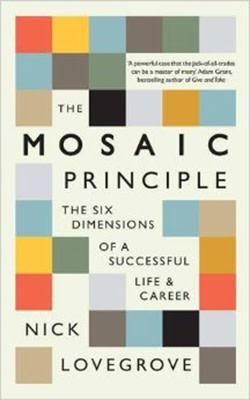Review — ‘The Mosaic Principle’

Roula Khalaf, Editor of the FT, selects her favourite stories in this weekly newsletter.
Ditch the corporate ladder and approach your career as Odysseus might, with brilliance, guile and versatility. This is the plea from author Nick Lovegrove in The Mosaic Principle: The Six Dimensions of a Successful Life & Career. In this part-philosophical, part-practical career guide, Lovegrove rails against businesses’ demands for greater specialisms, which tend to bind people into working lives of narrow experience.
Not only does this leave us unfulfilled, he says, but companies lack sufficient staff with the perspective to solve complex problems.
“The world is increasingly obsessed with the power of narrow, specialist expertise,” argues Lovegrove, “but if we always shape our lives that way then we all too easily become one-trick ponies.”
He says such individuals not only lose something of what makes them special but they also lack the transferable skills to succeed in a complex and diverse world.

Lovegrove’s remedy is for people to allow themselves the freedom to explore their intellectual interests throughout a wide-ranging career.
As working lives lengthen, so does the opportunity to meander across sectors and industries, leading to a deeper knowledge. This mosaic of skills and experience can then be pieced together: in this way, an interest in environmental law could take someone from private practice representing companies dealing with government regulation, to a government department while also working with environmental charities.
However, the high-flying individuals used as examples by Lovegrove are no wandering hippies. Take Dr Paul Farmer. He is professor of both medicine and anthropology at Harvard, a physician at a Boston hospital, and co-founder of Partners in Health, a not-for-profit for which he spends half the year working in Haiti.
And Jeff Seabright, who started in US federal government and led President Bill Clinton’s task force for climate change before moving to Texaco, Coca-Cola and Unilever.
While Lovegrove’s book aims to convey the virtues of breadth in building a life and career, he points out that it “should not be taken as a recipe for ‘randomness’, for the professional dilettante, [or] for being a ‘jack-of-all-trades and master of none’”.
A successful working person should aim to be a hybrid with both breadth and depth, which will give would-be employers a reason to call them.
Lovegrove has come up with “six dimensions” based on interviews with 200 people who have achieved this tricky balance. The dimensions are: applying your moral compass; defining an intellectual thread; developing transferable skills; investing in contextual intelligence; building an extended network, and having a prepared mind.
Lovegrove’s approach can be viewed as a T-shape, where the vertical stroke of the T is a deep expertise in subject matter, while the horizontal stroke is the ability to work outside a core area.
Lesser mortals can learn from the successes of Lovegrove’s overachievers. He argues that everyone should have the confidence and freedom to follow less linear and blinkered career paths, and this rings true.
The Mosaic Principle provides the bridge between the established portfolio career model that might straddle business, third sector and government, and the millennial, gig-economy, freelance model.
While senior executives have always sought to add strings to their bow by taking non-executive directorships, or becoming a consultant and building a portfolio career, Lovegrove’s book legitimises this approach for those in the middle years of a career, those who do not have the confidence of the younger, millennial generation to step off the corporate ladder and pursue their own odyssey.
The Mosaic Principle: The Six Dimensions of a Successful Life & Career by Nick Lovegrove, Profile Books, £16.99
Comments